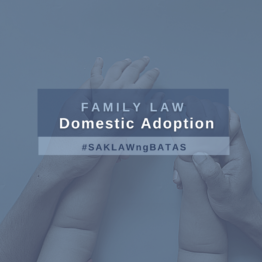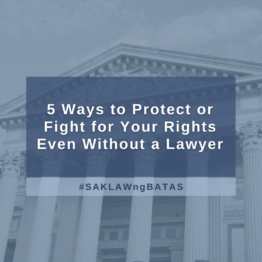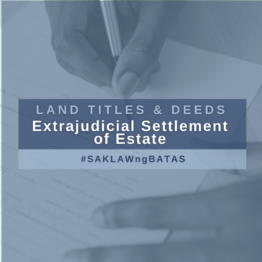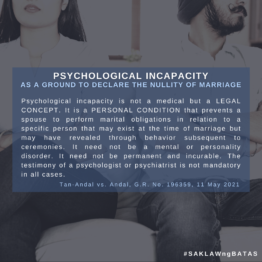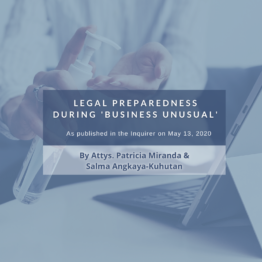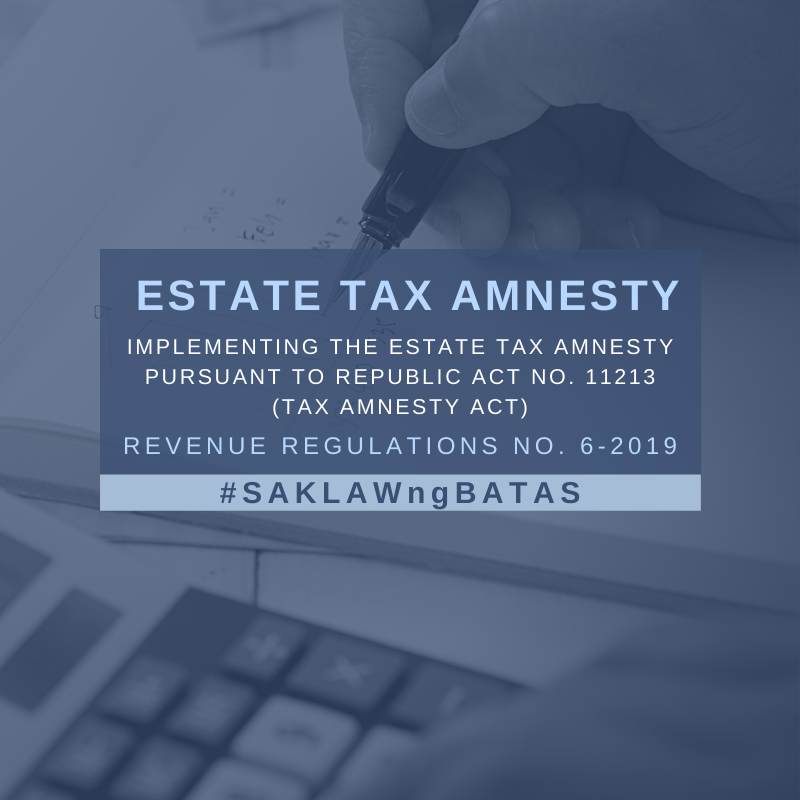
May 30, 2019
REVENUE REGULATIONS NO. 6-2019 – Implements the provisions of Estate Tax Amnesty pursuant to Republic Act No. 11213 (Tax Amnesty Act)
The Estate Tax Amnesty shall cover the estate of decedent/s who died on or before December 31, 2017, with or without assessments duly issued, therefore, whose Estate Tax/es have remained unpaid or have accrued as of December 31, 2017.RR. 6-2019 issued on implements the provisions of Estate Tax Amnesty pursuant to Republic Act No. 11213 (Tax Amnesty Act).
The Estate Tax Amnesty shall not extend to the following:
A. Delinquent estate tax liabilities which have become final and executory and those covered by Tax Amnesty on Delinquencies; and
B. Properties involved in cases pending in appropriate courts:
- Falling under the jurisdiction of the Presidential Commission of Good Government;
- Involving unexplained or unlawfully acquired wealth under R.A. No. 3019, otherwise known as the Anti-Graft and Corrupt Practices Act, and R.A. No. 7080 or an Act Defining and Penalizing the Crime of Plunder;
- Involving violations of R.A. No. 9160, otherwise known as the Anti-Money Laundering Act, as amended;
- Involving tax evasion and other criminal offenses under Chapter II of Title X of the National Internal Revenue Code (NIRC) of 1997, as amended; and
- Involving felonies of frauds, illegal exactions and transactions and malversation of public funds and property under Chapters III and IV of Title VII of the Revised Penal Code.
An Estate Tax Amnesty rate of six percent (6%) shall be imposed on each decedent’s total net taxable estate at the time of death without penalties at every stage of transfer of property in cognizance with the rules of succession under the Civil Code of the Philippines on the transmission of properties, interests, rights and obligations of the decedent. Provided, that the minimum Estate Amnesty Tax for the transfer of the estate of each decedent shall be Five Thousand Pesos (₱5,000.00).
The provisions of the NIRC of 1997, as amended, or the applicable estate/inheritance tax laws prevailing at the time of death of the decedent with respect to valuation, manner of computation, and other related matters shall apply suppletorily.
The gross estate of a decedent, as classified below, shall be comprised of the following properties and interest therein at the time of his/her death, and such lifetime transfers includible in the gross estate as enumerated under the Tax Code.
- Residents and Citizens – all properties, real and personal, tangible and intangible, wherever situated
- Non-resident Aliens – only real and personal properties situated in the Philippines
The properties comprising the gross estate of the decedent shall be valued, in general, based on the fair market value as of the time of death of the decedent.
If the property is a real property, the fair market value shall be the higher value between the zonal value as determined by the Commissioner of Internal Revenue and the fair market value as shown in the schedule of values fixed by the provincial and city assessors.
In the case of shares of stock, the fair market value shall be:
- Listed and traded in the stock exchange – The price at the time of death or the arithmetic mean between the highest and lowest quotation at a date nearest the date of death, if none is available on the date of death itself
- Not listed shares – The book value for common shares and par value for preferred shares as shown in the audited financial statement of the issuing corporation nearest to the date of death of the decedent. The valuation of these shares shall be exempt from the provisions of Revenue Regulations No. 06-2013, as amended
Proprietary shares in any association, recreation or amusement club shall be valued using the bid price on the date of death or nearest to the date of death, if none is available on the date of death itself, as published in the newspaper of general circulation.
Cash in bank in local and/or foreign currency shall be based on the peso value of the balance at the date of death.
For purposes of determining the Net Estate, the gross estate may be reduced by the deductions allowed by the Estate Tax law applicable at the time of death of the decedent.
For purposes of the Regulations, the Estate Tax Amnesty Return (ETAR) (BIR Form No. 2118-EA) shall be filed by the executor or administrator, legal heirs, transferees or beneficiaries within two (2) years from the effectivity of the Regulations with the Revenue District Office (RDO) having jurisdiction over the last residence of the decedent.
In case of a non-resident decedent, with executor or administrator in the Philippines, the return shall be filed with the RDO where such executor/administrator is registered or if not yet registered, at the executor/ administrator’s legal residence. In case of a non-resident decedent with no executor or administrator in the Philippines, the return shall be filed with RDO No. 39- South Quezon City.
The duly accomplished and sworn ETAR, and Acceptance Payment Form (APF) (BIR Form No. 0621-EA), together with the complete documents as enumerated in the ETAR, shall be presented to the concerned RDO for endorsement of the APF prior to the payment of the Estate Amnesty Tax with the Authorized Agent Banks (AABs) or Revenue Collection Officers (RCOs). However, only duly endorsed APF shall be presented to and received by the AAB or RCO.
After payment, the duly accomplished and sworn ETAR and APF with proof of payment, together with the complete documentary requirements shall be immediately submitted to the RDO in triplicate copies. Failure to submit the same within the two (2)-year period from the effectivity of the Regulations is tantamount to non-availment of the Estate Tax Amnesty and any payment made may be applied against the total regular estate tax due inclusive of penalties.
In case the estate has properties which were not declared in the previously filed return, the legal heirs/executors/administrators can file an ETAR or an amended ETAR, whichever is applicable, and pay the Estate Tax Amnesty as stated in Sec. 5 of the Regulations, without penalties, based on the net taxable value of the Net Undeclared Estate as defined in Sec. 4 (c) of the Regulations within two (2) years from the effectivity of the Regulations.
Undeclared properties, after the lapse of the two-year period from the effectivity of the Regulations, shall be subject to the applicable Estate Tax rate prevailing at the time of death including interest and penalties due thereon.
Properties included in the Estate Tax Amnesty availment which are likewise subject of taxable donation/sale shall be assessed of the corresponding donor’s/capital gains/or other applicable taxes at the time of donation/sale including penalties, if applicable.
The Certificate of Availment of the Estate Tax Amnesty shall be issued by the concerned RDO within fifteen (15) calendar days from the receipt of the application for Estate Tax Amnesty, together with duly validated APF and complete documentary requirements enumerated in BIR Form No. 2118-EA.
One (1) electronic Certificate Authorizing Registration (eCAR) shall be issued per real property including the improvements, if any, covered by Original Certificate of Title/Transfer Certificate of Title/Condominium Certificate of Title or Tax Declaration for untitled properties. For personal properties included in the estate, a separate eCAR shall be issued.
Concerned personnel who have been found remiss in their responsibilities in ensuring compliance with the policies and procedures prescribed in the Regulations shall be imposed with the applicable administrative sanctions as provided under existing policies.
Estates covered by Estate Tax Amnesty, which have fully complied with all the conditions set forth in the Regulations, including the payment of estate tax amnesty, shall be immune from the payment of all estate taxes as well as any increments and additions thereto, arising from the failure to pay any and all estate taxes for taxable year 2017 and prior years, and from all appurtenant civil, criminal and administrative cases, and penalties under the 1997 Tax Code, as amended.
The availment of the Estate Tax Amnesty herein provided and the issuance of the corresponding APF do not imply any admission of criminal, civil or administrative liability on the part of the availing estate.
Annex A (Please use the updated version of the Deductions under RMC No. 103-2019)
Annex B (Please use the updated version of the ETAR under RMC No. 103-2019)
(Published at the Malaya Business Insight on May 31, 2019)
All of the information on this website is provided as general information, not as legal advice, nor as a solicitation for legal services. The information is not provided in the course of an attorney-client relationship between Atty. Salma F. Angkaya-Kuhutan and anyone who views it. Viewers should not rely on the information contained in this website when making decisions regarding legal matters but should consult a qualified attorney for legal advice. You should not act based solely on the information found on this website and are strongly advised to seek the legal opinion of a lawyer.
You may contact the Attorney through the information provided on this website if you are interested in the legal representation, counseling, and related legal services that we provide. You may also learn more about our services relating to real estate transactions here.
Disclaimer: All of the information on this website is provided as general information, not as legal advice, nor as a solicitation for legal services. The information is not provided in the course of an attorney-client relationship between Atty. Salma F. Angkaya-Kuhutan and anyone who views it. Viewers should not rely on the information contained in this website when making decisions regarding legal matters but should consult a qualified attorney for legal advice. You should not act based solely on the information found on this website and are strongly advised to seek the legal opinion of a lawyer.
You may contact the Attorney through the information provided on this website if you are interested in the legal representation, counseling, and related legal services that we provide.

